![]()
Fri, March 18, 2011 | Reuters | AlJazeera | Jerusalem Post
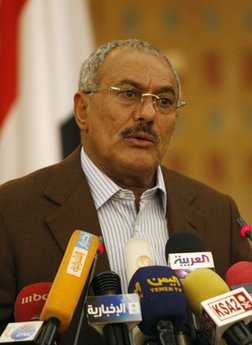
Yemeni President Ali Abdullah Saleh speaks during a media conference in Sanaa, Yemen, Friday, March 18, 2011. (AP Photo/Hani Mohammed)
Yemen Declares ‘State of Emergency’ after Protest Massacre
President Saleh announces state of emergency after dozens are killed in a crackdown on anti-government protests. Witnesses, medical sources say security forces, unidentified snipers shot at protesters.
Ali Abdullah Saleh, the Yemeni president, has declared a nationwide state of emergency, after a violent crackdown on anti-government protests killed at least 30 people, and left scores more wounded, in the capital Sanaa.
Saleh said on Friday that the decision to impose the state of emergency was made by the country’s national security council, but there was no immediate indication of how long it would last.
The Reuters news agency reported Saleh as saying that it was clear that there were “armed elements” amongst anti-government protesters, and that the clashes earlier in the day were between citizens and protesters, not protesters and security forces.
At least 30 people were killed and scores wounded after the Yemeni security forces opened fire on protesters at University square, in the capital Sanaa.
Security forces opened fire in attempts to prevent protesters from marching out of the square where they were gathered, sources said. Medical sources said the death toll was likely to rise.
Pro-government “thugs” also opened fire on protesters from houses close to University square, witnesses told the AFP news agency.
Medical sources and witnesses had told Reuters that Yemeni security forces and unidentified snipers had opened fire on the crowds after Muslim prayers in the capital, Sanaa. Tens of thousands of Yemenis had gathered in Sanaa for competing prayers and protesters accused plainclothes snipers of firing on the crowds from rooftops. [Jerusalem Post, March 18, 2011]
Muttahar al-Masri, the country’s interior minister, put the death toll at 25, and said that a curfew was being imposed as part of the state of emergency.
[…]
Ahead of the protests, hundreds of police patrolled the streets of Sanaa and elite forces set up fortifications around the presidential compound, ministries and the headquarters of Yemen’s ruling party.
Government forces have previously used live fire, rubber bullets, and tear gas on anti-regime rallies, in the government’s increasingly violent crackdown on protests.
Yemen, the Arabian Peninsula state neighbouring oil giant Saudi Arabia, has been hit by weeks of protests set in motion by uprisings in North Africa that toppled long-serving leaders in Tunisia and Egypt and spread to the Gulf states of Bahrain, Oman and Saudi Arabia.
Saleh has maintained a firm grip on power for over three decades and has scoffed at calls to step down, saying he will only do so when his current term of office expires in 2013.
Read more here.
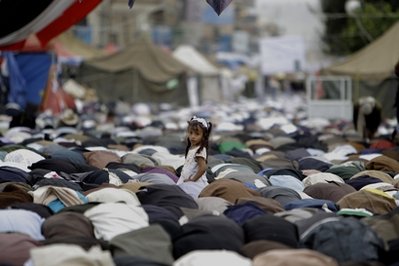
A Yemeni girl looks on while standing between anti-government protestors attending Friday prayers during a demonstration demanding the resignation of Yemeni President Ali Abdullah Saleh, in Sanaa, Yemen, Friday, March 18, 2011. (AP Photo/Muhammed Muheisen)
The United States, which has long seen Saleh as a bulwark against al Qaida, condemned the bloodshed and repeated its call for a negotiated end to the political crisis.
“The violence needs to end, negotiations need to be pursued in order to reach a political solution,” US Secretary of State Hillary Clinton told reporters after meeting Ireland’s deputy prime minister in Washington.
However, after the deaths, Yemen’s opposition said there was no way they could negotiate with Saleh’s government.
“We condemn these crimes,” said Yassin Noman, rotating president of Yemen’s umbrella opposition group.
“There is no longer any possibility of mutual understanding with this regime and he (Saleh) has not choice but to surrender authority to the people.”
Read more here.



 RSS
RSS


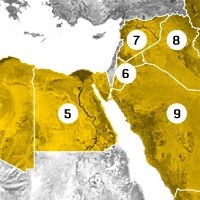
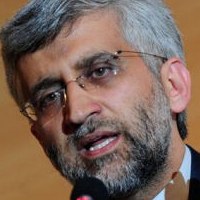
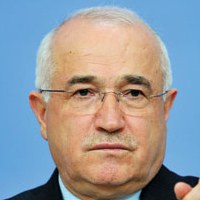





#Yemen Declares ‘State of Emergency’ after Protest Massacre | #Saleh http://j.mp/ikvEca
#Yemen Declares ‘State of Emergency’ after Protest Massacre | #Saleh http://j.mp/ikvEca http://ff.im/zuCZn
RT @CrethiPlethi: #Yemen Declares ‘State of Emergency’ after Protest Massacre | #Saleh http://j.mp/ikvEca http://ff.im/zuCZn
RT @CrethiPlethi: #Yemen Declares ‘State of Emergency’ after Protest Massacre | #Saleh http://j.mp/ikvEca